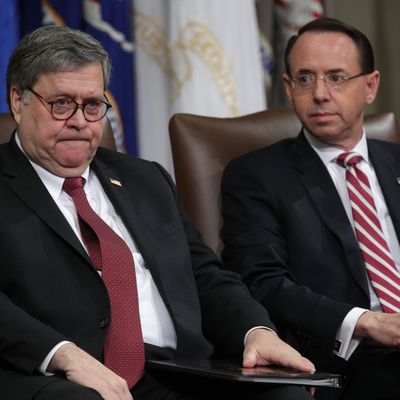
While the big, underlying question in Robert Mueller’s investigation was possible collusion between Russia and President Trump (and/or his campaign) during the 2016 election, a second issue was whether Trump and company obstructed justice by interfering with that or associated investigations. The two issues did not automatically rise or fall together. After all, Richard Nixon was not charged with having planned or even known about the Watergate break-in in advance, yet he was forced to resign because of clear evidence that he tampered with the Watergate investigation and then lied about it repeatedly.
So even as Trump’s allies start crowing about Mueller’s “no collusion” finding, as described in the summary Attorney General William Barr sent to Congress, a more troubling part of the letter discusses how Mueller and subsequently the Justice Department dealt with the obstruction issue. Here’s the pertinent language:
After making a “thorough factual investigation” into these matters, the Special Counsel considered whether to evaluate the conduct under Department standards governing prosecution and declination decisions but ultimately determined not to make a traditional prosecutorial judgment. The Special Counsel therefore did not draw a conclusion — one way or the other — as to whether the examined conduct constituted obstruction. Instead, for each of the relevant actions investigated, the report sets out evidence on both sides of the question and leaves unresolved what the Special Counsel views as “difficult issues” of law and fact concerning whether the President’s actions and intent could be viewed as obstruction. The Special Counsel states that “while this report does not conclude that the President committed a crime, it also does not exonerate him.”
You don’t need a law degree to find that language strange and troublesome. Basically (again, assuming Barr’s summary is accurate) Mueller punted any legal conclusions about possible obstruction of justice to Trump’s Justice Department. Not very surprisingly, they decided there was nothing to be done:
After reviewing the Special Counsel’s final report on these issues; consulting with Department officials, including the Office of Legal Counsel; and applying the principles of federal prosecution that guide our charging decisions, Deputy Attorney General Rod Rosenstein and I have concluded that the evidence developed during the Special Counsel’s investigation is not sufficient to establish that the President committed an obstruction-of-justice offense.
Barr ruled out one possible reason for this decision:
Our determination was made without regard to, and is not based on, the constitutional considerations that surround the indictment and criminal prosecution of a sitting president.
This means that the DoJ did not simply rely on its past opinion that sitting presidents cannot be indicated to reach its conclusion that Trump can’t be indicted, even if anyone else committing the same acts might be headed to court if not the hoosegow right this minute. But there’s also this rather broad hint as to how Rosenstein and Barr reached their conclusion:
In making this determination, we noted that the Special Counsel recognized that “the evidence does not establish that the President was involved in an underlying crime related to Russian election interference,” and that, while not determinative, the absence of such evidence bears upon the President’s intent with respect to obstruction.
In other words, if Trump had no reason to obstruct justice, maybe he didn’t. That’s legalese for the sports referee’s fallback excuse for doing nothing: “No harm, no foul.”
When the full Mueller Report becomes available, of course, there will be plenty of second-guessing about the special counsel’s decision to punt on obstruction of justice, and DoJ’s decision that there was not enough evidence to even consider the possibility of indicting Trump. The same independent inquiries will take place on the collusion issues. But it’s clear the president and his allies will follow the same logic as Barr on obstruction of justice: if there was no collusion, then Trump would have been stupid or at least self-destructive — in a word, crazy — if he tried to stop an investigation into his campaign’s conduct towards Russian interlopers. And Trump’s fans and hirelings cannot admit the man might have unnecessarily risked blowing up his presidency.






























